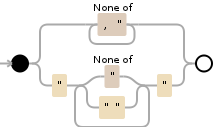在字段内使用逗号分析CSV文件
我刚收到一位同事的文件,不知道如何解析这个:
输入:
key,value1,"value2,hello"
期望的输出:
key,value2
Perl或Python是我理解的语言。
谢谢,Bernardo
5 个答案:
答案 0 :(得分:3)
标准Perl模块Text::ParseWords可用于处理CSV文件。
#!/usr/bin/perl
use strict;
use warnings;
use Text::ParseWords;
while (<DATA>) {
my @fields = parse_line(',', 0, $_);
# Do something useful with the data in @fields
print join ' | ', @fields;
}
__DATA__
key,value1,"value2,hello"
答案 1 :(得分:2)
这是valid CSV syntax,因此您只需使用CSV解析器。
您没有指定使用哪种语言,但大多数都在类库中可以使用CSV解析器(例如,.NET中的TextFieldParser)或作为外部组件(例如{{3在Apache Commons for Java中)。
如果你做想要重新发明轮子(我不推荐),算法很简单:
result = "", inQuotes = false
read next character
if end-of-line:
if inQuotes:
throw error (unmatched quotes)
yield result
return
else if character = '"':
invert inQuotes
else if character = ',' and not inQuotes:
yield result
result = ""
else:
result += character
答案 2 :(得分:0)
答案 3 :(得分:0)
如果要为此任务使用正则表达式,则以下内容应该有效:
(\S+,)\d+,\"(\d+),\S+\"
(\S+,)是第一个选择第一个键的捕获组,包括逗号。接下来是一些数字,一个逗号和一个引用\d+,\"。第二个捕获组(\d+)选择第二个值,后跟逗号,字符串和引号:,\D+\"
但正如其他人已经写过的那样,其他解决方案并不涉及正则表达式。
答案 4 :(得分:0)
相关问题
最新问题
- 我写了这段代码,但我无法理解我的错误
- 我无法从一个代码实例的列表中删除 None 值,但我可以在另一个实例中。为什么它适用于一个细分市场而不适用于另一个细分市场?
- 是否有可能使 loadstring 不可能等于打印?卢阿
- java中的random.expovariate()
- Appscript 通过会议在 Google 日历中发送电子邮件和创建活动
- 为什么我的 Onclick 箭头功能在 React 中不起作用?
- 在此代码中是否有使用“this”的替代方法?
- 在 SQL Server 和 PostgreSQL 上查询,我如何从第一个表获得第二个表的可视化
- 每千个数字得到
- 更新了城市边界 KML 文件的来源?
